
An organizational chart is crucial in event planning. It demonstrates the structure and roles within an event company, as it helps organize, delegate, and coordinate among team members. Event organizational charts promote better communication, reduce confusion, and improve efficiency in daily operations.
This article explores the process of creating an effective event planning org chart. It will also provide hot tips for implementing the essential event planning requirements. Read on below to learn more.
In this article
Understanding Event Organizational Charts
An effective org chart should be easily understood, appealing, and regularly reviewed. It should be able to accommodate changes in team structure or event requirements. An event organizational chart is a valuable tool for event planners to ensure every step goes accordingly.
1. Benefits of Using Organizational Charts in Event Planning
Using organizational charts in event planning offers several benefits. Here are some of their fine qualities:
Clear Roles and Responsibilities
Org charts define the roles and responsibilities of each team member. It leaves no room for ambiguity. The clarity helps team members understand their specific duties. This will ensure that tasks are assigned and completed effectively.
Improved Communication and Coordination
Organizational charts establish reporting lines and communication channels. This facilitates efficient flow and collaboration within the event planning team. Clear communication helps prevent misunderstandings and reduces unnecessary duplication of effort.
Enhanced Efficiency and Productivity
Organizational charts minimize confusion and inefficiencies By clearly delineating roles and reporting relationships. They help team members understand who to approach for approvals, feedback, or assistance. This will result in smoother workflows and improved productivity.
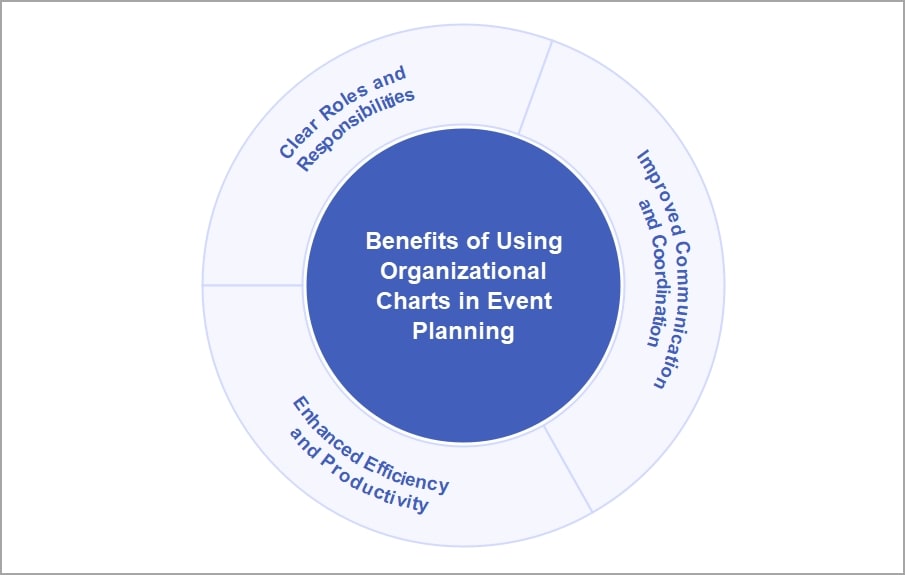
2. The Key Elements and Components of an Effective Organizational Chart
An effective event organizational chart should factor into the following key elements and components:
- Positions and Roles: Define and outline the various positions and roles within the event planning team. This includes department heads, managers, coordinators, and individual contributors.
- Reporting Relationships: Establish reporting lines. This shows the hierarchy and flow of authority within the organization. It helps team members understand the chain of command and who they report to.
- Departments or Teams: Organize the chart into departments or teams based on functional areas. This includes marketing, logistics, operations, and more. It enables clear identification of responsibilities within the event planning process.
- Communication Channels: Indicate the formal and informal communication channels within the organization. This includes specifying who needs to be informed or consulted for decision-making. Make sure there are appropriate communication methods for different situations.
- Key Contacts: Include key contacts, such as external stakeholders or vendors. They play a crucial role in the event planning process.
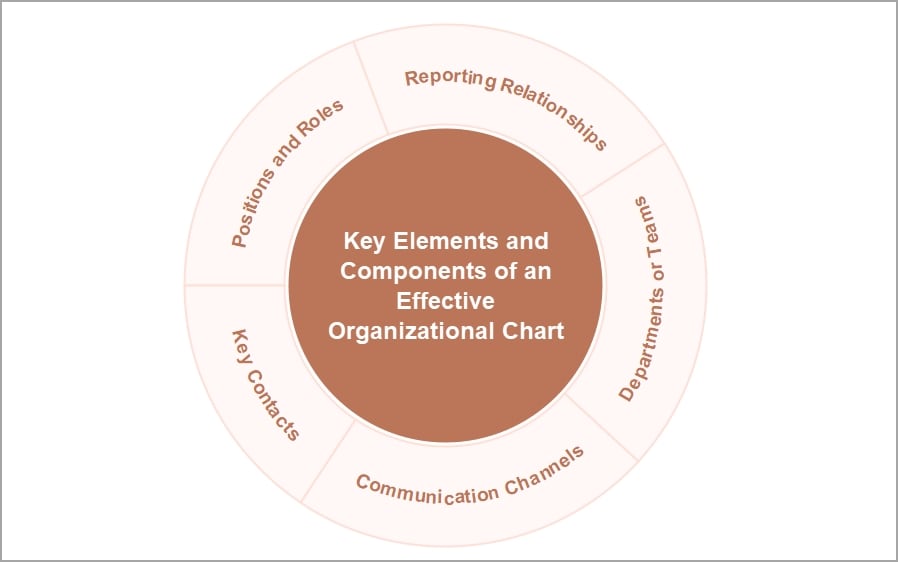
Examples of an Effective Event Organizational Chart
Effective event org charts display structures for event planning and management. Below are three event charts showing clear roles, responsibilities, and reporting lines.
1. Church Event Organizational Chart
This chart for a church event effectively divides responsibilities among various departments. The event coordinator oversees the entire process. Meanwhile, each department has clear roles and objectives.
Marketing focuses on the event's theme and handling advertising strategies. The food department manages the menu planning and food display aspects. Decorations handle the procurement of supplies and decorating plans. Set-up/tear-down manages staging and logistics for the event. Volunteer placement ensures proper job descriptions and assigns volunteers to suitable roles. Lastly, event activities are responsible for managing prizes for participants. The chart enables efficient decision-making, communication, and execution of tasks.
2. Event Organizational Chart of an Events Manager
The event manager leads the entire event organization in this event org chart. The venue coordination department includes booking, setting up teams, to insurance. The program department manages entries, tabulation, and computer scores. The marketing department focuses on publicity, advertising, media kits, and more. The hospitality department handles sponsor liaison, catering, and reception of dignitaries. The merchandising department oversees the sales team, giveaways, and outfitting of volunteers.
This event organizational chart ensures a well-structured event management process. With the event manager at the helm, the various departments work cohesively.
3. Advisor's Event Organization Chart
This advisor's org chart focuses on the roles involved in event management. The advisor provides expertise and advice. Meanwhile, the chairman takes responsibility for the event. There are essential aspects such as finance, sponsorship, and marketing. It also has logistics and food & beverage. This streamlined structure ensures effective decision-making, coordination, and execution of the event.
Produce Attractive Event Organizational Charts With Wondershare EdrawMind
EdrawMind simplifies the process of designing organizational charts. It's a versatile software that serves as a mind-mapping tool and an org chart generator. You can create, customize, and share professional-looking org charts in minutes.
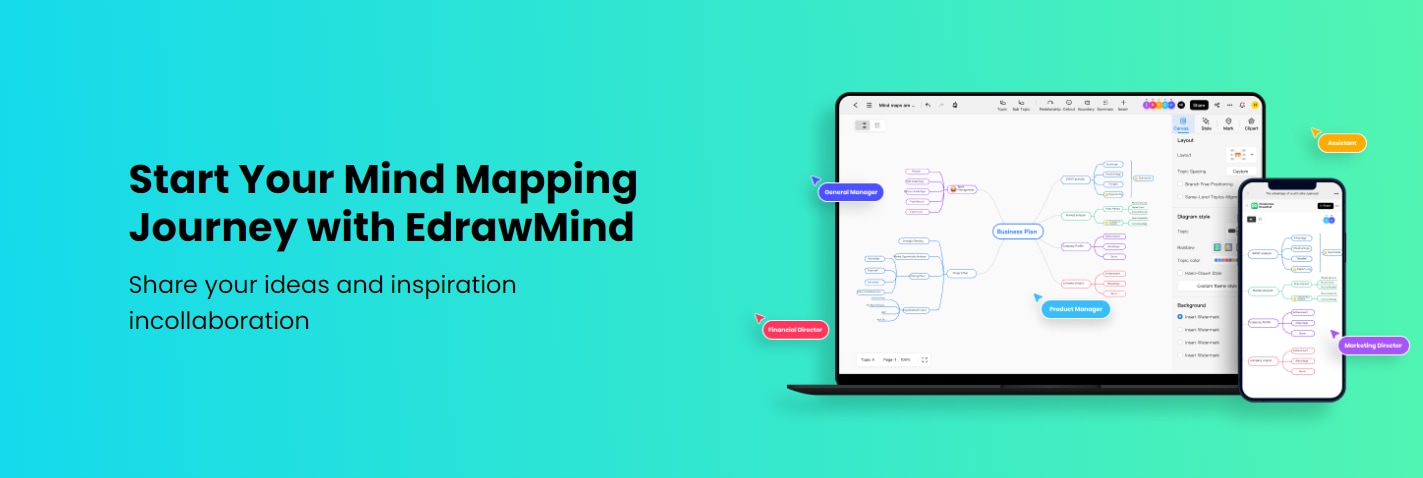
Key Features
EdrawMind is a valuable tool for businesses, educators, and creative thinkers. Here are some of its key features.
- Mind Mapping: EdrawMind enables users to capture and structure ideas using intuitive mind maps. It offers various templates, shapes, and customization options. The options allow users to visually represent concepts, brainstorm, and organize thoughts efficiently.
- Organizational Charts: The app's org chart feature simplifies creating clear org charts. It has pre-designed templates, drag-and-drop functionality, and automatic layout options. This makes it easy to define an organization's relationships, roles, and responsibilities.
- Collaboration and Sharing: The tool supports real-time collaboration. It lets team members work together on mind maps and org charts simultaneously. EdrawMind also allows users to share their creations in multiple formats. This facilitates seamless collaboration, feedback, and knowledge sharing.
Creating an Organizational Event Chart With EdrawMind
Creating event org charts using EdrawMind allows you to save time and effort. It's equipped with tools to get your chart up and running in minutes. Below are the steps for your reference.
Step 1: Download and install EdrawMind on your PC. Next, run the program. Click the New button and choose the Org Chart tool to start your project. This will automatically generate a template to get you started.
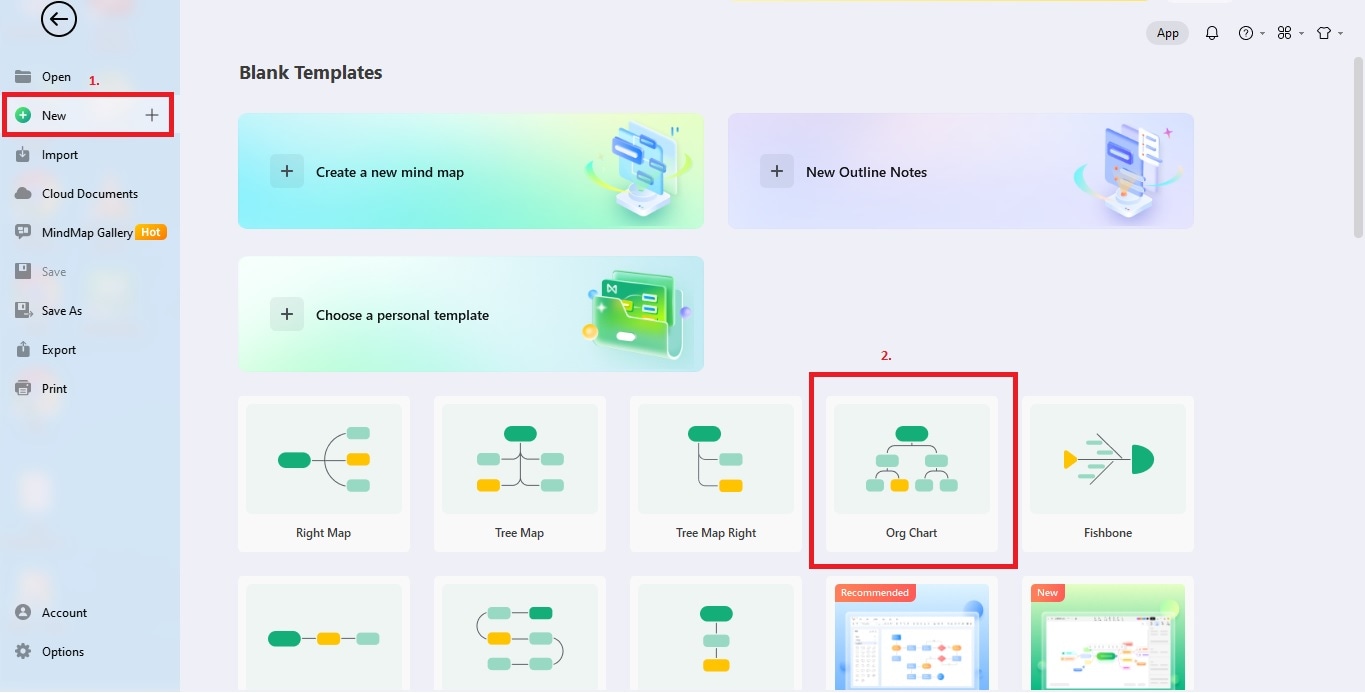
Step 2: At the top navigation pane, click on Topics, Subtopics, Floating Topic, or Multiple Topics. From there, double-click on each topic to add text and details. You can include department names, position titles, and relevant personnel names.
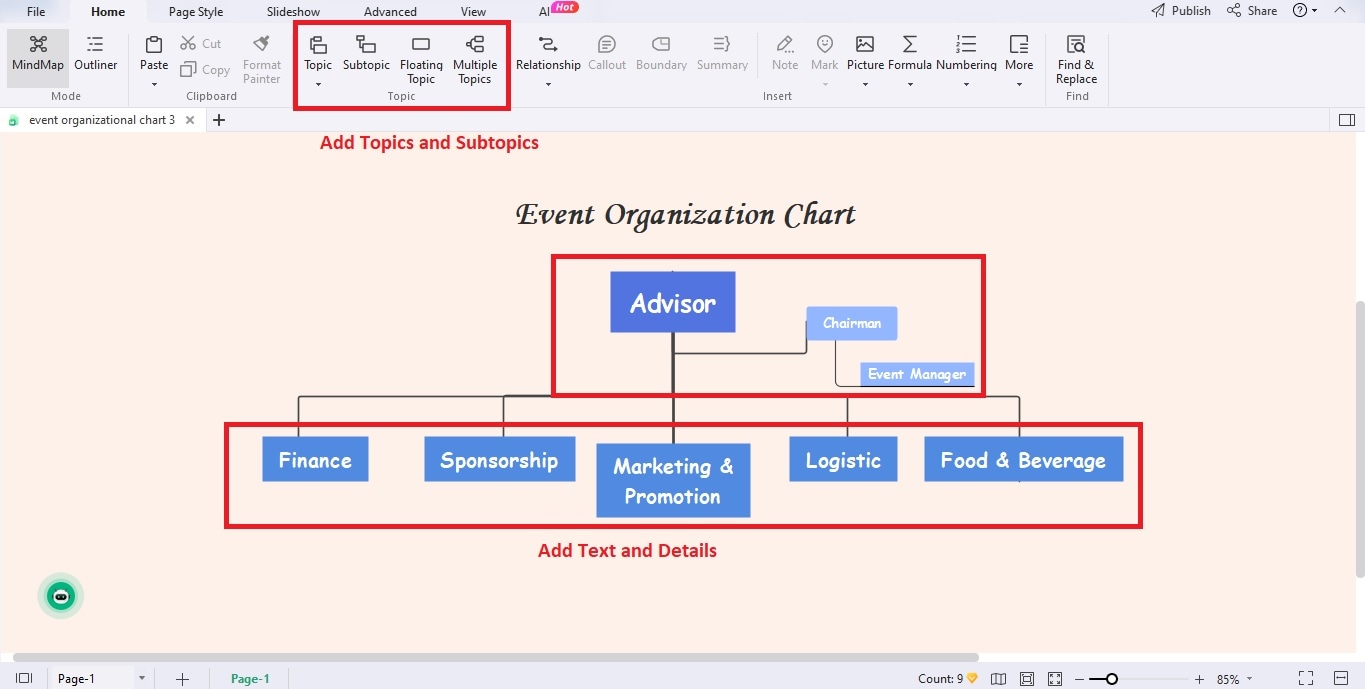
Step 3: Once the topics are in place, click the Relationships button. Drag the connector lines between the topics to improve the chart's clarity. In addition, you can also customize the chart to make it more presentable by editing the font, size, and color. Simply click on the right panel to access these tools.
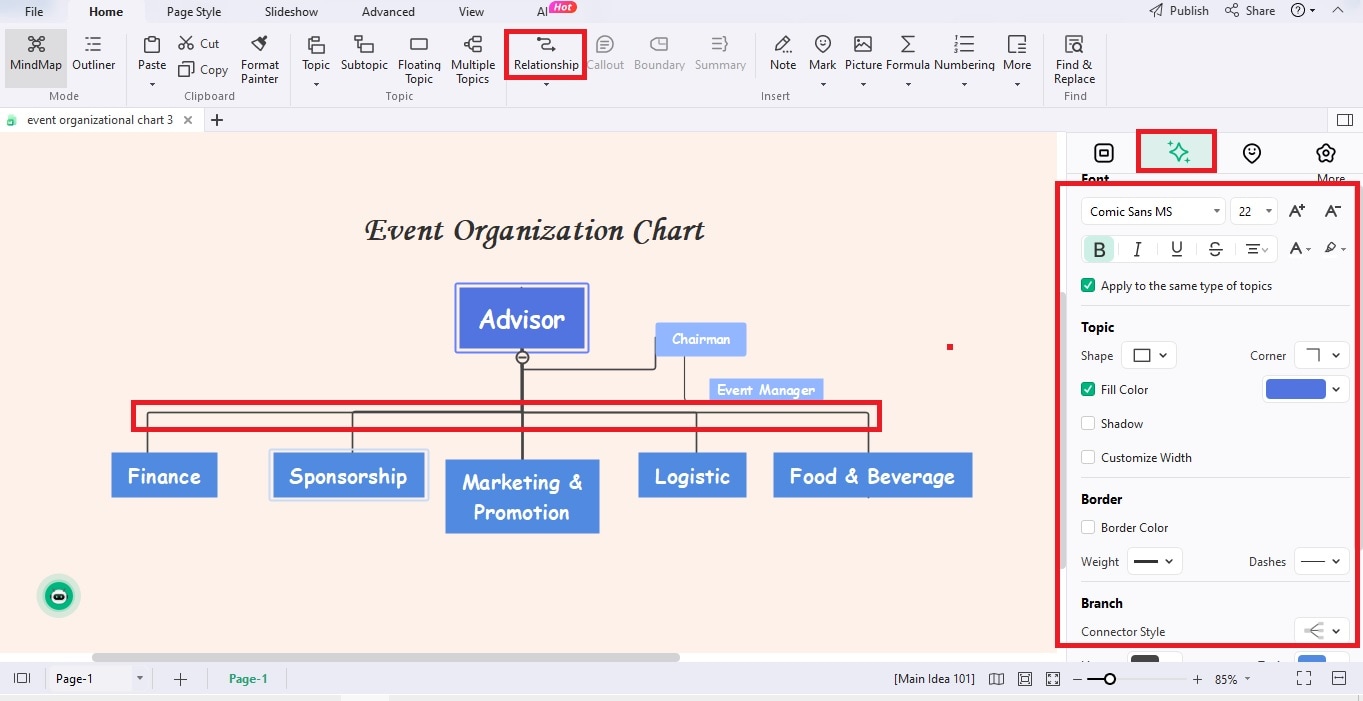
Step 4: Customize your event org chart's appearance to fit your brand's style. Click the right side panel to access the Map tool. You can change the color scheme, apply themes, and add images or icons to the chart to represent different departments or positions.
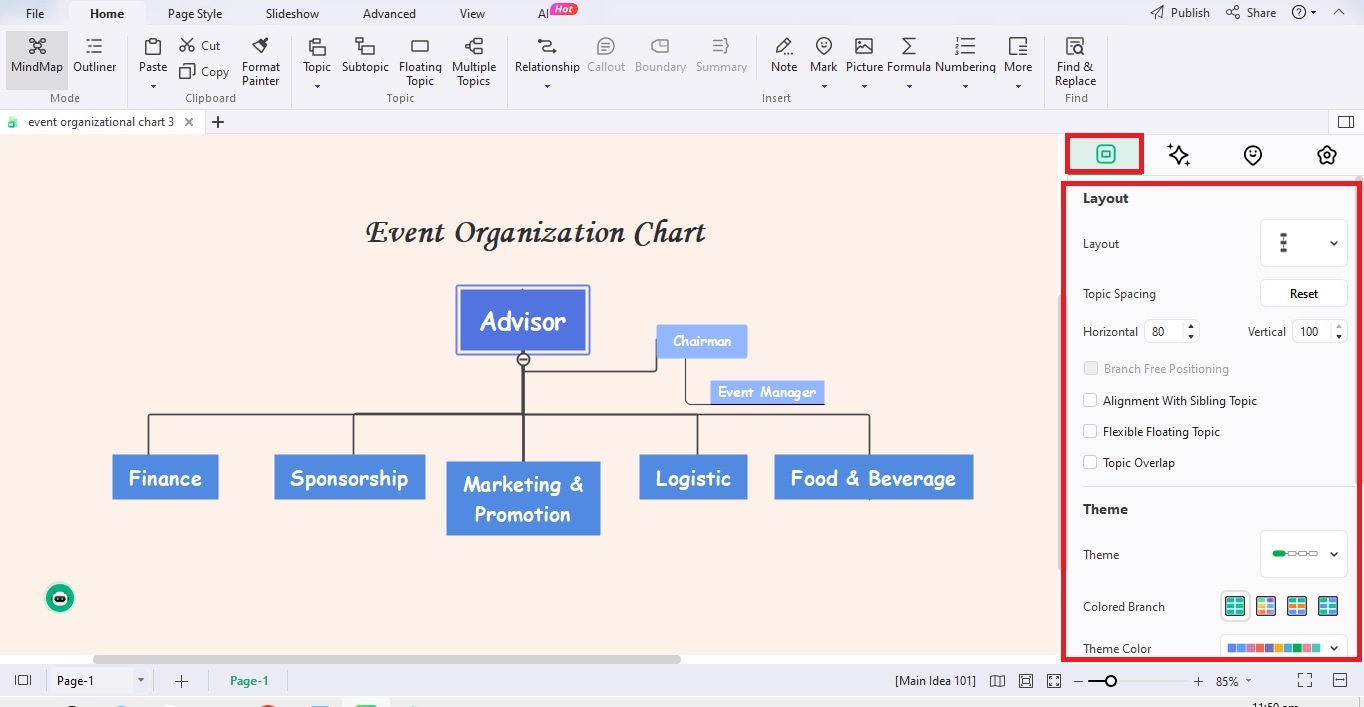
Step 5: After editing, save your created event org chart in your preferred format. EdrawMind allows you to save your chart in JPEG, PNG, and PDF format. You can also export the finalized version to Word or PowerPoint, making it a versatile tool for sharing and collaboration.
Additional Information and Best Practices
Learning from best practices and addressing common challenges is crucial to create an influential event planning org chart. Here are three common challenges and corresponding solutions.
1. Balancing Roles and Responsibilities
Assigning roles and responsibilities within the org chart is complex. This becomes a challenge, especially when there are overlapping or ambiguous tasks. Having clear and well-defined roles and responsibilities for each position in the chart is essential. Ensure that each role has specific objectives and areas of accountability to minimize confusion. Regularly review and update the organizational chart to accommodate changes and evolving needs.
2. Communication and Collaboration
Inefficient communication among team members can hinder the flow of event planning tasks. You should incorporate clear lines of communication in the organizational chart. Specify reporting relationships and communication channels. Encourage regular meetings, feedback sessions, and collaborative tools. Foster a culture of open communication and encourage active engagement within the event planning team.
3. Scalability and Adaptability
You often need to adapt your structure to accommodate different types and sizes of events. Design the org chart with flexibility and scalability in mind. Consider creating teams that can be easily expanded or contracted based on the event's requirements.
Conclusion
Embracing the power of event org charts can unlock the potential for success. They play a vital role in the execution of event planning endeavors. They provide a clear structure and definable roles and responsibilities. It facilitates effective communication and coordination within event companies.
To create impactful charts, consider using tools like EdrawMind. It offers user-friendly features for designing and customizing organizational charts. Event planners can streamline operations and enhance team collaboration by using these resources.




 below.
below.  below.
below. 

